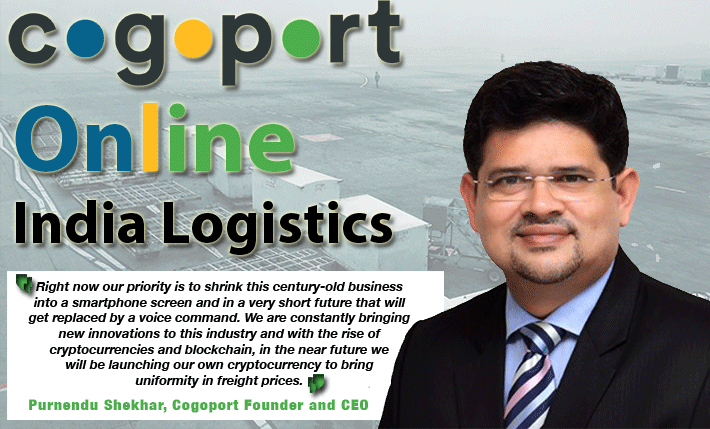 |
“We are driven by the pains of our
customer and that’s basically the soul of our organization. Our
core mission is to decentralize things for efficiency and use available
resources in the ecosystem for best use of customers.”
That quote came from Cogoport Founder and
CEO Purnendu Shekhar.
Set up in India’s financial capital,
Mumbai, Cogoport is an online logistics platform that will provide the
best air freight rates for customers. The services will start in
a couple of months. It is already doing that for ocean rates. An industry
veteran—Shekhar has been in the “industry ecosystem for 22-odd
years”—he had the distinct feeling that he was being left
out of “logistics.” He wanted to transform the “ecosystem's
existing framework and put customers at the top of the list. So Cogoport
was born.
Shekhar explained that logistics made up
around 14.4 percent of India’s GDP. The Indian freight market, he
said, was estimated to reach $ 300bn by 2020, of which the international
freight component would be around $40bn and would grow at an estimated
12-14 percent CAGR. “This segment is complex and inefficient with
multiple players adding layers of opacity leading to significant cost
to the buyer and sub-optimal capacity utilization for suppliers.”
Simply put, a fragmented, localized, scale-inefficient and technology-deprived
market made the opportunity size “huge,” he emphasized.
What Cogoport does as an online international
freight exchange is provide price discovery and booking using a data-driven
technology solution, enabling a simpler, smoother, and seamless freight
booking experience for international freight.
“The value proposition of Cogoport
centers around seamless and quality services at the best price for business
houses to export and import goods warehouse to warehouse through a transparent,
full-stack solution for all stakeholders from the convenience of their
mobiles and PCs,” said Shekhar.
The online platform has been certified
under the ‘Startup India’ initiative of the government (under
the Department of Industrial Policy & Promotion). “We are confident
we will be able to leverage the ‘Make in India-led initiatives’
and derive benefits along the line,” said Shekhar.
Cogoport was quite aware of the challenges
when it launched in May 2017, but Shekhar and his team have been concentrating
on customer-centricity. “That’s basically the soul of our
organization,” he said. To achieve this, technology has been enabled.
Also, the company “decentralizes things for efficiency and uses
available resources in the ecosystem for best use of customers,”
he pointed out. “Our space is B2B and we understand how it works
so we work the way our customer works without trying to impose ourselves
on them and this really sets us apart from all,” he said.
Delving into the working of the system,
Shekhar’s team members said that the platform’s complex algorithm
takes millions of line items—prices, transit times, vessel details
for 100,000 port pairs across the world and hundreds of suppliers—runs
through distributed computing models, and displays best freight rates
in the personalized dashboard of an importer and exporter, where it can
then be booked in a single click. After the shipment is booked, the operations
dashboard allows customers to track the shipments and also provides numerous
analytics around that particular shipment.
“Right now our priority is to shrink
this century-old business into a smartphone screen and in a very short
future that will get replaced by a voice command. We are constantly bringing
new innovations to this industry and with the rise of cryptocurrencies
and blockchain, in the near future we will be launching our own cryptocurrency
to bring uniformity in freight prices,” said Shekhar.
Cogoport believes in the democratization
of freight and services. While large MNCs want transparency and small
organizations need price benefit, Cogoport pointed out that it has a perfect
value proposition for both.
Barely a few months old, Cogoport has made
its mark with 1,700 registered clients. The revenue growth, according
to Shekhar’s team, has been strong. Cogoport is currently clocking
an annual revenue rate of $10 million while the volume rate has been annualized
at 9,000 containers and 2,500 truck moves, with ocean freight accounting
for 95 percent of it.
Shekhar hopes he will be able to see the
same enthusiasm from the air freight community when Cogoport opens its
portal for air transport.
For the moment, Cogoport is not interested
in making profits. It wants to scale up and then it will think of revenue
streams, which will be largely from suppliers’ commissions and commissions
from banks and other financial institutions.
Tirthankar Ghosh |





